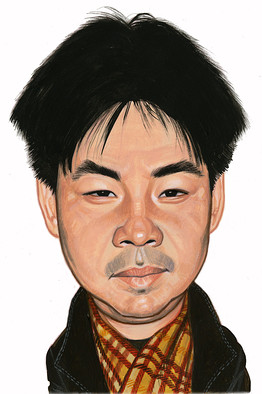Walking through the capital's university district, Yu Hua looks more like a migrant worker than one of China's best-selling authors. His hair short and spiky, his clothes simple and plain, he does not fit in -- and clearly doesn't make much of an effort to do so.
余華走在北京的大學區里,看上去更像是一個農民工,而不像是中國一流的暢銷書作家。他短短的頭發直豎起來,衣服簡單而樸素,而且不大合身──很顯然,他也沒在這方面下什么功夫。
That attitude extends to his view of contemporary society, which he says is so sick that a writer can't pretend to be a doctor. Instead, the best one can do is admit that one is ill and try to describe the symptoms. This ethos underpins 'Brothers,' a sprawling, two-part novel that has just come out in an English translation in the U.S. and will be published in April in Britain.
這種態度延伸到了他對當代社會的看法。他說,這個社會已經無藥可救,作家也不能再扮作社會的醫生。一個人所能做的就是承認自己有病,并且盡力去描述病情。這一思想貫穿著《兄弟》,一部分為上下兩部的長篇巨制。這部小說的英文版剛剛在美國問世,今年四月該書還將在英國上市。
The book is a manic, hyperactive account of two brothers whose stories span the past 50 years of hardcore communism and today's no-holds-barred capitalism. 'At times the novel is grotesque and crude, but there's nothing I write about that is more absurd than what goes on in society,' he says as we rush past crowds of university students en route to a restaurant that serves the cuisine of Mr. Yu's native Zhejiang province.
余華以一種瘋狂而亢奮的筆觸敘述了兩兄弟的故事。整個小說從過去純粹的共產主義寫到今天不折不扣的資本主義,橫跨了五十年。余華在我們匆匆穿過一群群大學生,去往一家經營浙江菜的餐廳途中說,這部小說有時候顯得怪誕而粗俗,但社會上真實發生的事情比我筆下所有的故事更為荒誕不經。浙江是余華的老家。
Politics is one of the 46-year-old's main interests. His most famous work, 'To Live,' is a brutal, mythic tale of a man who loses all to the political movements that tore across China during the first three decades of Communist Party rule, but manages to keep going through his sheer will to live. The book, which was filmed by the star director Zhang Yimou, remains a bestseller in China. His other works are symbolic almost to the point of caricature. His 1995 'Chronicles of a Blood Merchant' tells the story of a man who sells his blood to get by. 'Cries in the Drizzle,' published in 2003, is about a boy who seems to bring bad luck to everyone he touches.
政治是46歲的余華最感興趣的領域之一。他最知名的作品《活著》講述的是一個虛構的殘忍故事。在共產黨執政的頭三十年里,故事的主人公在席卷中國的政治運動中失去了自己的所有,但他憑著活下去的決心生存了下來。這部小說至今在中國還是本暢銷書,這個故事還被著名導演張藝謀搬上了大熒幕。他的其他作品很有象征意味,簡直和漫畫有異曲同工之妙。他1995年的小說《許三觀賣血記》講述了一個男人為維持生計而賣血的故事。2003年出版的《在細雨中呼喊》是關于一個男孩的故事。這個男孩碰誰一下,誰似乎就會倒霉。
'Brothers' is strongly in that vein. It follows two half-brothers whose lives are almost a parody of reform-era China: one a crass, vulgar businessman who succeeds through corruption and brutality, and fetishizes virgins; the other a meek man who ends up victimized by higher economic forces. When it came out in 2005 and 2006, it elicited protests from literary critics across the country, who said the novel makes heroes of villains and descends to the level of fart jokes for humor. There was even a collection of essays published by a group of critics called 'Pulling Yu Hua's Teeth,' a play on his first profession of dentistry.
《兄弟》延續了這樣的風格。小說中那對異父異母兄弟的生活簡直就是對改革時期中國戲劇式的再現:弟弟是個粗魯、邋遢的生意人,靠著鉆空子和一股子狠勁兒發家,內心還有處女情結;老實的哥哥則最終成為經濟大轉型時代的犧牲品。這本小說的上下兩部分別在2005年和2006年問世后,遭到了全國上下文學批評家們的反對聲浪。他們認為,這部小說把無賴歌頌成英雄,而且為了搏人一笑小說淪落到了粗俗的地步。一些文學批評家甚至還出版了一本名為《給余華拔牙》的評論集,嘲弄余華的第一份職業是牙醫。
Mr. Yu shrugs off the disapproval. Most of his critics, he says, are young people who are either ashamed he's airing China's dirty linen, or don't even realize that the corrupt backwaters he describes still exist in modern China. 'This generation that grew up in the 1980s only experienced a China that was getting better and better,' he says. 'They thought their lives represented all of China. But this is a mistake. China has over 100 million people earning less than 800 yuan ($125) a year.'
余華對這些批評并不在意。他說,大多數批評他的人是年輕人,他們或者不喜歡看到他揭露中國黑暗的一面,或者根本沒有意識到他在書中描寫的那些陰暗面依然存在于現代的中國。他說,80后的這一代人只感受到了一個越變越好的中國。他們認為全中國人都過著和他們一樣的生活。但那是錯誤的。中國有超過1億人的年收入不足人民幣800元(合125美元)。












